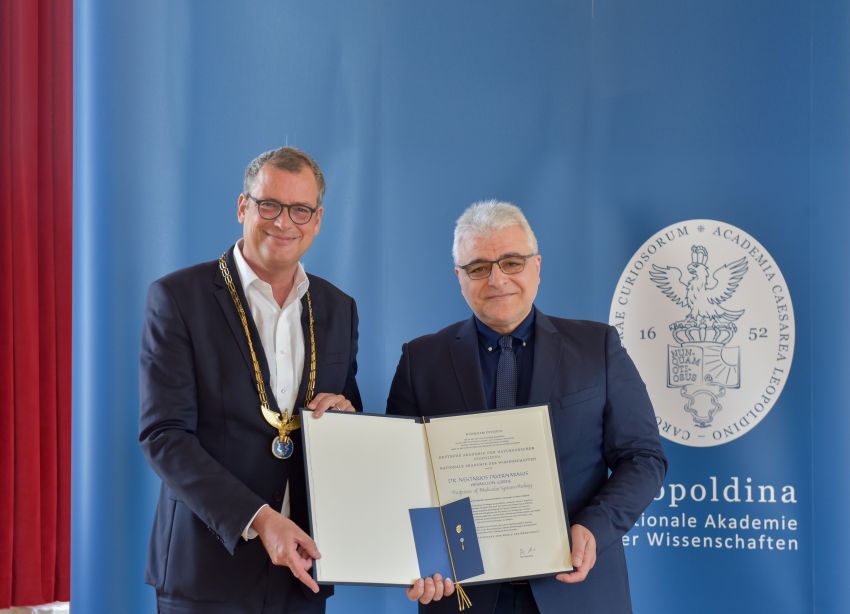All Science News

Dual academic distinction for Professor Nektarios Tavernarakis
Nektarios Tavernarakis, Chairman of the Board of Directors at the Foundation for Research and Technology Hellas (FORTH) and Professor at the Medical School of the University of Crete, was recently elected Member of the European Academy of Sciences and the German National Academy of Sciences Leopoldina. These significant distinctions are bestowed as recognition of the scientific quality and the highly competitive research conducted at FORTH and the University of Crete.
The nomination of Prof. Tavernarakis to the European Academy of Sciences (EurASc), was enthusiastically supported by all members of the full General Board, following a stringent and thorough evaluation process. EurASc Membership is bestowed to the best European scientists, with a vision for Europe, transcending national borders, and the aim of strengthening European science and scientific cooperation. Among the objectives of the Academy is to take advantage of the expertise of its members in advising other European bodies for the betterment of European research, technological application and social development. EurASc carries an important mission to promote excellence in science and technology and their essential roles in fostering social and economic development and progress. Its Members are leading scientists, who have been recognized for their seminal contributions to pioneering research and technology. The official induction ceremony for Prof. Tavernarakis will be held in October 2023, in Madrid.
In addition to his Membership to the European Academy of Sciences, Prof. Nektarios Tavernarakis was recently induced to the German National Academy of Sciences Leopoldina, where he was elected as a Member, in an official ceremony which took place this month in Halle, Germany. Membership to the German National Academy of Sciences is bestowed to scientists who have distinguished themselves by academic achievements of excellence and by their overall scientific standing. Members are evaluated and elected by the Presidium and the Senate of the Academy. The German National Academy of Sciences aims to promote scientific and social development for the benefit of society. Its members are leading scientists, who are internationally recognized for their scientific work and distinguished for their high-quality, innovative research. The Academy has around 1,600 Members, 187 of whom have been awarded the Nobel Prize. Nektarios Tavernarakis is the second Greek scientist to be elected a member of the German Academy and the first in the field of Biomedical Sciences.
Nektarios Tavernarakis is also a member of the American Association for the Advancement of Science (AAAS), the European Molecular Biology Organization (EMBO), the European Academy of Sciences and Arts (EASA), Academia Europaea, and the Academy of Athens.
Short Biography
Nektarios Tavernarakis is Professor of Molecular Systems Biology at the Medical School of the University of Crete, in Heraklion, Greece. He is also the Chairman of the Board of Directors at the Foundation for Research and Technology-Hellas (FORTH), and Research Director at the Institute of Molecular Biology and Biotechnology (IMBB) of FORTH, where he is heading the Neurogenetics and Ageing laboratory. He is the Founder and first Director of the Graduate Program on BioInformatics at the University of Crete. He is Chairman of the European Institute of Innovation and Technology (EIT) Governing Board, and has served as Vice President of the Scientific Council of the European Research Council (ERC), and Director of IMBB. His work focuses on the molecular mechanisms of necrotic cell death and neurodegeneration, the interplay between cellular metabolism and ageing, the mechanisms of sensory transduction and integration by the nervous system, and the development of novel genetic tools for biomedical research. He has published numerous scientific papers in top-tier, cross-discipline, international scientific journals, in addition to invited book chapters, and other publications, including editorials, commentaries, and science-popularizing articles. His research has been commended internationally, and is supported by highly competitive funding from the European Union, international organizations and the Greek Government. For his scientific accomplishments, he has received several notable scientific prizes, including two ERC Advanced Investigator Grants, and an innovation-supporting ERC Proof of Concept Grant. He is also the recipient of the EMBO Young Investigator award, the Alexander von Humboldt Foundation, Friedrich Wilhelm Bessel research award, the Helmholtz International Fellow Award, the Galien Scientific Research Award, the BioMedical Research Award of the Academy of Athens, the Bodossaki Foundation Scientific Prize for Medicine and Biology, the Empeirikeion Foundation Academic Excellence Prize, among others.








